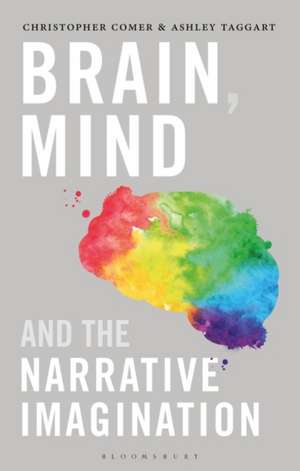Brain, Mind, and the Narrative Imagination
Autor Professor Christopher Comer, Dr Ashley Taggarten Limba Engleză Paperback – 24 feb 2021
| Toate formatele și edițiile | Preț | Express |
|---|---|---|
| Paperback (1) | 136.71 lei 3-5 săpt. | +29.53 lei 7-13 zile |
| Bloomsbury Publishing – 24 feb 2021 | 136.71 lei 3-5 săpt. | +29.53 lei 7-13 zile |
| Hardback (1) | 469.59 lei 6-8 săpt. | |
| Bloomsbury Publishing – 24 feb 2021 | 469.59 lei 6-8 săpt. |
Preț: 136.71 lei
Preț vechi: 146.64 lei
-7% Nou
Puncte Express: 205
Preț estimativ în valută:
26.16€ • 28.50$ • 22.04£
26.16€ • 28.50$ • 22.04£
Carte disponibilă
Livrare economică 02-16 aprilie
Livrare express 19-25 martie pentru 39.52 lei
Preluare comenzi: 021 569.72.76
Specificații
ISBN-13: 9781350127791
ISBN-10: 1350127795
Pagini: 304
Ilustrații: 28 bw illus
Dimensiuni: 156 x 234 x 18 mm
Greutate: 0.48 kg
Editura: Bloomsbury Publishing
Colecția Bloomsbury Academic
Locul publicării:London, United Kingdom
ISBN-10: 1350127795
Pagini: 304
Ilustrații: 28 bw illus
Dimensiuni: 156 x 234 x 18 mm
Greutate: 0.48 kg
Editura: Bloomsbury Publishing
Colecția Bloomsbury Academic
Locul publicării:London, United Kingdom
Caracteristici
Explores literary, theoretical and scientific writings by the likes of Jim Crace, Antonio Damasio, Charles Darwin, Daniel Dennett, Ian McEwan and I.A. Richards
Notă biografică
Christopher Comer is Professor of Neuroscience at the University of Montana, USA. Ashley Taggart is Lecturer in the School of English Drama and Film at University College Dublin, Ireland.
Cuprins
List of Figures Preface Acknowledgments Introduction Back to the Future PART I: Motivations to Explore Our Storied Mind Chapter 1 The Scheherazade Syndrome Chapter 2 Orchestrating the Imagination PART II: Into the Neural Terrain Chapter 3 Brain and Behavior Chapter 4 Deep Substrates of Narrative Imagination PART III: The Journey from Words to Narratives Chapter 5 Compelled by Words Chapter 6 The Cognitive Habitat of Narratives PART IV: Converging Paths? Chapter 7 Affective Cognition and Sociality Chapter 8 The Feeling of What Happened Chapter 9 Memory, Imagination, Self Chapter 10 The via dolorosa of the Self Afterword References Cited Index
Recenzii
It is easy to get lost in the narrative of this book, only to remember how meta the experience is. This accessible book will interest readers in the sciences as well as the humanities.
I have always thought that studies of the brain conducted by neuroscientists had nothing to tell us about the literary imagination and the process of interpretation. After reading Christopher Comer and Ashley Taggart's new book, I find my mind completely changed. Drawing on multiple disciplines on both sides of the aisle, the authors amply demonstrate that by exploring the master category of narrative our understanding of both the brain as a physical mechanism and of literature as a resource for living can be greatly enhanced. A notable achievement!
This book is an essential read, since it offers eloquent debate around story-telling, what it has to tell us about the brain, and thence about ourselves.
Of the works I am aware of, [Brain, Mind and the Narrative Imagination] provides the clearest, most thorough, and fairest treatment of neurocognitive literary study today.
I have always thought that studies of the brain conducted by neuroscientists had nothing to tell us about the literary imagination and the process of interpretation. After reading Christopher Comer and Ashley Taggart's new book, I find my mind completely changed. Drawing on multiple disciplines on both sides of the aisle, the authors amply demonstrate that by exploring the master category of narrative our understanding of both the brain as a physical mechanism and of literature as a resource for living can be greatly enhanced. A notable achievement!
This book is an essential read, since it offers eloquent debate around story-telling, what it has to tell us about the brain, and thence about ourselves.
Of the works I am aware of, [Brain, Mind and the Narrative Imagination] provides the clearest, most thorough, and fairest treatment of neurocognitive literary study today.
